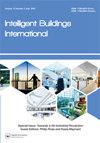Editorial: smart buildings
IF 1.7
Q2 CONSTRUCTION & BUILDING TECHNOLOGY
引用次数: 1
Abstract
In the old days, ‘buildings’ provide a sense of security to safeguard the human life and properties from dangers. The research endeavours focused on structural designs and construction methods to prevent buildings from being damaged or collapsing. Nowadays people are not only satisfied with the sense of security, but also the quality of life a vital cornerstone of sustainability. The researchers are therefore focusing on equipping ‘smart’ capabilities so enabling ‘intelligent buildings’ to be planned, designed, constructed, and maintained with the aim of improving and upgrading human life in terms of health and wellbeing. In recent years, the development of ‘smart enablers for intelliegent buildings’ pushed by both the academia and practitioners worldwide in the building and construction sectors can be observed, due to the advancement of technologies such as sensing technologies. On 17–21 June 2019, the Conseil International du Bâtiment (CIB) World Building Congress 2019 (WBC 2019) on Constructing Smart Cities took place in The Hong Kong Polytechnic University with the host being the Department of Building and Real Estate. This triennial international congress facilitated the in-depth exchange of research ideas on various aspects of Smart Intelligent Cities including planning, design, construction, operation, and maintenance, and fostered the close collaboration between academia and practitioners. During the CIB WBC 2019, particularly, the CIB Working Commission Group W098 chaired by ProfessorDerekClements-Croome andDrTongYang, fruitful, constructive, and inspiring discussions about intelligent buildings for people were launched and highlighted for implementation. In general, the related topicswere centred onenergyand environmental performancesof smart buildings byapplying sensing devices and information platforms. The reported research works can be found with reference to the established CIB themes of intelligent buildings and infrastructures, smart planning, design and construction, smart services all contributing to intelligent and responsive buildings. Built upon the research works presented in the CIB WBC 2019, outstanding conference papers were selected and invited for enriching the contents which were accepted for publication after rigorous peer review in this special issue of ‘Intelligent Buildings International’ which aims to increase the awareness of intelligent and smart city development. Highlights of each paper is provided below for readers’ reference. Paper 1: Maintenance service optimization in smart buildings through ultrasonic sensors network The opening paper presented by Moretti et al. (2020) proposed a smart building maintenance strategy using ultrasonic sensors. This research study used ultrasonic sensors for detecting and monitoring the occupancy in buildings. Once the occupancy data are analysed with reference to the pre-defined threshold, the require-maintenance alert will be triggered automatically. The feasibility of the proposed smart system was proved and validated by a real-world case study in Italy. Discussions were given to the sensors’ cost and level of precision. This innovation enhances the cost-effectiveness of facility maintenance management service towards smart buildings. Paper 2: Bayesian updates for indoor environmental quality (IEQ) acceptance model for residential buildings The second paper written by Tsang et al. (2020) developed an indoor environmental quality acceptance model for smart residential buildings based on the Bayesian updating technique. Bayesian approach was innovatively used to update the objective indoor environmental quality model driven by the subjective indoor environmental quality responses. Notably, those responses are社论:智能建筑
在过去,“建筑”提供了一种安全感,以保护人类的生命和财产免受危险。研究工作的重点是防止建筑物受损或倒塌的结构设计和施工方法。如今,人们不仅满足于安全感,而且生活质量是可持续发展的重要基石。因此,研究人员正专注于装备“智能”能力,从而使“智能建筑”能够得到规划、设计、建造和维护,以改善和提升人类生活的健康和福祉。近年来,由于传感技术等技术的进步,可以观察到世界各地建筑和建筑行业的学术界和从业者推动的“智能建筑的智能推动者”的发展。2019年6月17日至21日,香港理工大学举行了关于建设智能城市的2019年世界建筑大会(WBC 2019),主办方是建筑与房地产系。本次三年一度的国际大会促进了智能城市规划、设计、建设、运营和维护等各个方面的研究思路的深入交流,促进了学术界和从业者之间的密切合作。在2019年CIB WBC期间,特别是由DerekClements Croome教授和TongYang博士主持的CIB工作委员会W098小组,就智能建筑为人们展开了富有成果、建设性和鼓舞人心的讨论,并强调要实施。总的来说,通过应用传感设备和信息平台,相关主题集中在智能建筑的能量和环境性能上。报告的研究工作可以参考CIB的既定主题,即智能建筑和基础设施、智能规划、设计和施工、智能服务,所有这些都有助于智能化和响应性建筑。在CIB WBC 2019的研究成果基础上,评选并邀请了优秀的会议论文,以丰富经过严格同行评审后被接受发表的内容,在本期“智能建筑国际”特刊中发表,旨在提高人们对智能和智慧城市发展的认识。以下是每篇论文的亮点,供读者参考。论文1:通过超声波传感器网络优化智能建筑的维护服务Moretti等人(2020)提出了一种使用超声波传感器的智能建筑维护策略。这项研究使用超声波传感器来检测和监测建筑物的占用情况。一旦参照预定义阈值分析了占用数据,将自动触发需要维护警报。所提出的智能系统的可行性通过意大利的真实案例研究得到了证明和验证。讨论了传感器的成本和精度水平。这一创新提高了智能建筑设施维护管理服务的成本效益。论文2:住宅室内环境质量(IEQ)验收模型的贝叶斯更新Tsang等人撰写的第二篇论文。(2020)基于贝叶斯更新技术开发了智能住宅的室内环境质量验收模型。创新性地使用贝叶斯方法来更新由主观室内环境质量响应驱动的客观室内环境质量模型。值得注意的是,这些回应是
本文章由计算机程序翻译,如有差异,请以英文原文为准。
求助全文
约1分钟内获得全文
求助全文
来源期刊

Intelligent Buildings International
CONSTRUCTION & BUILDING TECHNOLOGY-
CiteScore
4.60
自引率
4.30%
发文量
8
 求助内容:
求助内容: 应助结果提醒方式:
应助结果提醒方式:


